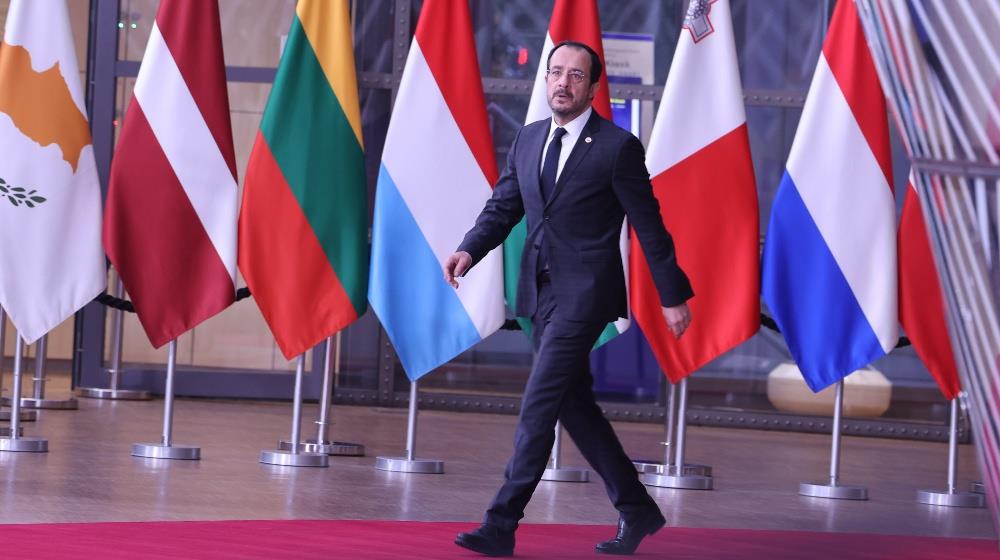The position of the Republic of Cyprus on the SAFE (Security and Defence Fund for Europe) mechanism has been adopted, President of the Republic Nikos Christodoulides has said, speaking upon his arrival at the European Council meeting in Brussels.
“I am pleased that our position regarding the participation of non-EU countries in the SAFE mechanism has been adopted,” the President said on Thursday, 23 October, making clear that “no third country that occupies territory or threatens the security of member states can, under any circumstances, participate in or benefit from any EU financial instruments in the field of defence and security.”
The President also referred to the strategic importance of the first-ever EU–Egypt Summit, noting that “our country, together with Greece and some other Mediterranean states, has long supported the need for this strategic partnership.” He added that this cooperation was first materialised with the 2024 visit of the European Commission President to Cairo — in which he also took part — and continued on Wednesday with the inaugural summit.
President Christodoulides noted that the Egyptian President had called for the EU’s active involvement in implementing the US President’s plan for Gaza and added that he had the opportunity to brief on Cyprus’ own plan — “a plan developed in coordination with the President of the European Commission, the United Arab Emirates, Egypt, Jordan and Israel.”
The six-point Cypriot proposal
“Today, in the framework of the European Council, I will have the opportunity to present it in detail, asking my EU counterparts to adopt the plan of the Republic of Cyprus as an EU plan,” he said.
He added that he also presented the Cypriot proposal at the European People’s Party (EPP) meeting, noting that it had been prepared in consultation with the Commission President.
Answering a question on the Gaza plan, he said that “the response was very positive” from EU partners, adding that “during the trilateral meeting between the Presidents of the Commission, the Council and Egypt, the Commission President presented the Cypriot proposals as European proposals.”
“What must happen now,” he continued, “is to work so that these proposals are implemented, in combination with other existing initiatives, to ensure that the plan of the American President is put into effect. Because if this plan is not implemented and we do not move to the next phase, you understand the risks of a new crisis in the region and who, in the end, will suffer the consequences.”
He added that the EU cannot, for example, discuss migration issues while ignoring the broader Middle East, “a region from which a significant number of migrants originate.”
Priorities of the Cypriot EU Presidency
Referring to the upcoming Cypriot Presidency of the Council of the EU — less than 70 days away — President Christodoulides said that during Cyprus’ term “we will work so that the Mediterranean Pact is transformed from a text into concrete actions for the wider Mediterranean and Middle East region, showing in practice that the EU has both a voice and a role in the region.”
He added that Cyprus’ goal during its Presidency is “to strengthen the EU’s strategic autonomy in all sectors – defence, security, raw materials, the fight against bureaucracy and the digital transition.”
He also expressed satisfaction that, “for the first time, the issue of housing may be discussed at the European Council,” describing it as “a major European challenge.”
“It is a pan-European problem, an issue some argue falls primarily under national competence. However, since it concerns all European countries, and in light of the ongoing discussions on the Multiannual Financial Framework, we expect the Commission to develop a financial tool that can be utilised by all member states,” he said.
Sanctions against Russia
On the war in Ukraine and EU sanctions against Russia, President Christodoulides said that “the 19th package of sanctions against Russia has been adopted.” He added that “there are US sanctions mainly concerning the energy sector, and proposals have been made by EU leaders on how to replace the energy supplies that can no longer be channeled to Europe under US restrictions.”
Referring to the possible meeting between the US and Russian Presidents, he said that if the discussion concerns Ukraine, “I believe that the President of Ukraine should be present, because the future of his country cannot be discussed without his participation.”
He added that the sanctions introduced so far have been effective.
"If some associated member states, some countries that want to become members of the European Union were following the sanctions of the European Union for sure all decisions and the sanctions will be much more effective,” he said.
Asked about a possible discussion within the EPP regarding the voting process in the occupied areas of Cyprus, the President clarified that “no such discussion took place on the sidelines of the EPP meeting.”
“I had the opportunity to discuss this development bilaterally with some of my counterparts. We all understand that we will be judged at the negotiation table,” he concluded.
Cyprus has been divided since 1974, when Turkey invaded and occupied its northern third. Repeated rounds of UN-led peace talks have so far failed to yield results. The latest round of negotiations, in July 2017 at the Swiss resort of Crans-Montana ended inconclusively.
(Source: CNA)









